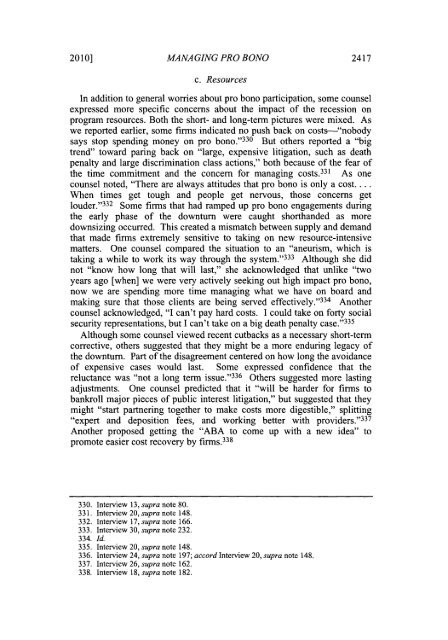Law for The Poor
Law for The Poor
Law for The Poor
Create successful ePaper yourself
Turn your PDF publications into a flip-book with our unique Google optimized e-Paper software.
2010] MANAGING PRO BONO<br />
2417<br />
c. Resources<br />
In addition to general worries about pro bono participation, some counsel<br />
expressed more specific concerns about the impact of the recession on<br />
program resources. Both the short- and long-term pictures were mixed. As<br />
we reported earlier, some firms indicated no push back on costs--"nobody<br />
says stop spending money on pro bono." 330 But others reported a "big<br />
trend" toward paring back on "large, expensive litigation, such as death<br />
penalty and large discrimination class actions," both because of the fear of<br />
the time commitment and the concern <strong>for</strong> managing costs. 331 As one<br />
counsel noted, "<strong>The</strong>re are always attitudes that pro bono is only a cost....<br />
When times get tough and people get nervous, those concerns get<br />
louder." 332 Some firms that had ramped up pro bono engagements during<br />
the early phase of the downturn were caught shorthanded as more<br />
downsizing occurred. This created a mismatch between supply and demand<br />
that made firms extremely sensitive to taking on new resource-intensive<br />
matters. One counsel compared the situation to an "aneurism, which is<br />
taking a while to work its way through the system." 333 Although she did<br />
not "know how long that will last," she acknowledged that unlike "two<br />
years ago [when] we were very actively seeking out high impact pro bono,<br />
now we are spending more time managing what we have on board and<br />
making sure that those clients are being served effectively." 334 Another<br />
counsel acknowledged, "I can't pay hard costs. I could take on <strong>for</strong>ty social<br />
security representations, but I can't take on a big death penalty case." 335<br />
Although some counsel viewed recent cutbacks as a necessary short-term<br />
corrective, others suggested that they might be a more enduring legacy of<br />
the downturn. Part of the disagreement centered on how long the avoidance<br />
of expensive cases would last. Some expressed confidence that the<br />
reluctance was "not a long term issue." 336 Others suggested more lasting<br />
adjustments. One counsel predicted that it "will be harder <strong>for</strong> firms to<br />
bankroll major pieces of public interest litigation," but suggested that they<br />
might "start partnering together to make costs more digestible," splitting<br />
"expert and deposition fees, and working better with providers." 337<br />
Another proposed getting the "ABA to come up with a new idea" to<br />
promote easier cost recovery by firns. 338<br />
330. Interview 13, supra note 80.<br />
331. Interview 20, supra note 148.<br />
332. Interview 17, supra note 166.<br />
333. Interview 30, supra note 232.<br />
334. Id.<br />
335. Interview 20, supra note 148.<br />
336. Interview 24, supra note 197; accord Interview 20, supra note 148.<br />
337. Interview 26, supra note 162.<br />
338. Interview 18, supra note 182.

















